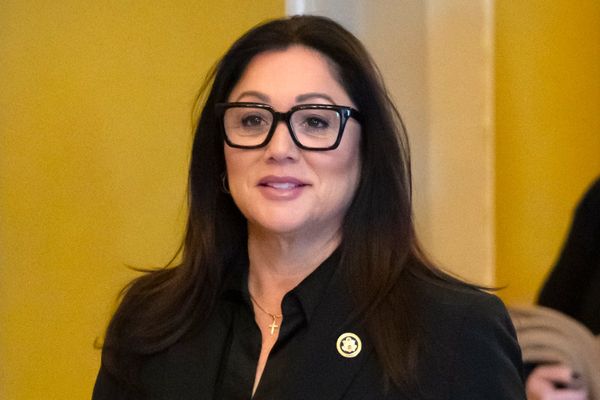
Benjamin Netanyahu used maps of Hezbollah missile sites and intelligence gained from a Mossad raid in Tehran to make sure Donald Trump backed Israel in Middle East peace talks and pulled out of the Iran nuclear deal, the former Israeli prime minister writes in a new memoir.
But in unconventional scenes similar to those in countless books of reportage and Trump tell-alls, Netanyahu also says that to sway Trump from his desire to pursue peace between Israel and the Palestinians and to scotch his positive first impression of Mahmoud Abbas, the Palestinian leader, the Israelis deployed golfing metaphors and maps of New York City.
The Palestinians, Trump was told, were hostile and wanted a border as close to Tel Aviv as the George Washington Bridge is to Trump Tower. A lasting peace, Trump was told, was as likely as “a hole-in-one through a brick wall”.
The former and possibly future Israeli leader’s book, Bibi: My Story, will be published in the US on Tuesday. The Guardian obtained a copy.
Netanyahu stuck close to Trump throughout the latter’s time in the White House, between 2017 and 2021. Both are now out of power. Netanyahu’s memoir will be published under the shadow of corruption charges, while Trump faces legal jeopardy from investigations of the US Capitol riot, his business practices and a defamation lawsuit over a rape allegation, which he denies.
Predictably, Netanyahu ticks off policy successes, among them US withdrawal from the Iran deal, the US embassy moving to Jerusalem and the US recognizing Israeli sovereignty over the Golan Heights.
Netanyahu also describes the genesis and signing of the Abraham Accords, normalization deals signed by Israel and four Arab countries.
Netanyahu avoids comment on American domestic politics, including Trump’s refusal to accept his defeat by Joe Biden, his lies about electoral fraud and his incitement of the US Capitol riot of 6 January 2021.
Nor does Netanyahu comment on Trump’s reported comment in his direction – “Fuck him” – after the Israeli congratulated Biden on his election victory.
But Trump being Trump – a president of “inherent irreverence”, in Netanyahu’s words – colorful details of private meetings do make it to print.
Describing Trump’s first meeting in Israel, in May 2017 with the Israeli president, Reuven Rivlin, Netanyahu echoes an account by David Friedman, then US ambassador to Israel, in his own book.

“When he was with Rivlin,” Netanyahu writes, “Trump blurted out, ‘Bibi doesn’t want peace.’ For some unfathomable reason, this bombshell wasn’t leaked.”
Netanyahu says Ron Dermer, then Israeli ambassador to the US, was “flabbergasted. This was not, ‘Houston, we have a problem.’ This was, ‘Houston, we are the problem!”
Netanyahu describes how he and Friedman contrived to play Trump a video meant to “adjust his thinking about Mahmoud Abbas, and about” Netanyahu. The tape portrayed the Palestinian leader as two-faced, talking peace in English and praising terrorists in Arabic.
Netanyahu writes: “I could see that the video registered with Trump, at least momentarily. ‘Wow,’ he said. ‘Is that the same guy I just met in Washington? He seemed like such a sweet, peaceful guy.’
“Naturally, Trump didn’t like being taken for a fool. I hoped the video would mitigate further bonding during his scheduled meeting with Abbas in Bethlehem on the last day of the trip.”
Friedman has said the tape stunt earned a rebuke from Rex Tillerson, then secretary of state, and HR McMaster, then national security adviser, Trump administration “adults” who thought the video “a cheap propaganda trick”.
Netanyahu now reveals that he deployed further visual aids for Trump, who even so early in his presidency was known not to read briefing papers, to become bored easily and to prefer advice framed in reference to his own interests.
Netanyahu says he showed “a simple slide for the president. It showed the distance from Tel Aviv to the 1967 lines to which the Palestinians demanded we retreat. Superimposed on the map was the distance from Trump Tower to the George Washington Bridge. The two distances” – a little more than six miles as the crow flies – “were identical.
“‘Mr President,’ I said, ‘would you let a regime that wants to annihilate you set up a state at the George Washington Bridge? Of course not. Neither would we.’
“Ron also reached for an analogy that would resonate with the president: golf. ‘Mr President,’ he said, ‘peace with the Emirates is a five-foot putt. Peace with the Saudis is a 30-foot putt. And peace with the Palestinians is a hole-in-one through a brick wall.’
“The president got it. For the time being at least, we had certainly moved him to a better place.”
Netanyahu cites Friedman’s description of how Trump subsequently “leveled into Abbas … demanding to know who he really was, a peacemaker as he claimed in Washington or a terrorist as he proclaimed on the tape”.
But Netanyahu also repeatedly describes his frustration as Trump continued with a “fixation with the Palestinians” rather than “a great political deal of peace with Arab states that I believed was around the corner”.
Netanyahu had more immediate success in shepherding Trump out of the Iranian nuclear deal, to which the US was a signatory in 2015, under Barack Obama.
In his memoir, Netanyahu describes a Mossad raid on a Tehran warehouse from which Israel took “an enormous amount of material” about Iranian nuclear plans.
On 5 March 2018, in the Oval Office in Washington, Netanyahu played Trump another short video, about what the Israelis said they found.
“The president pointed to the other senior officials in the Oval Office and said, ‘Maybe they needed to see this. I didn’t. I’ve already decided to leave the deal.’”
On 30 April, Netanyahu went public about the raid. In Israel, he faced criticism for divulging details of a Mossad operation. In his book, he denies any breach of secrecy and says he was only discussing results.
A week later, Trump pulled out of the Iran nuclear deal.







